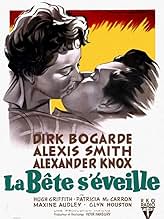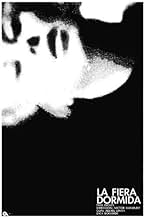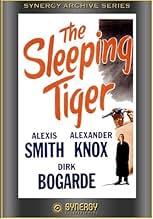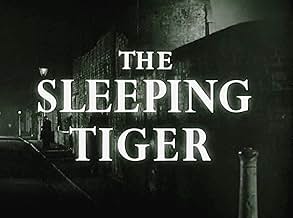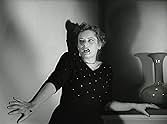IMDb-BEWERTUNG
6,5/10
1398
IHRE BEWERTUNG
Nachdem ein Krimineller in das Haus eines Psychotherapeuten einbricht, entgeht er durch die Einwilligung in eine Resozialisierung einer Verhaftung, jedoch entwickelt die Frau des Therapeuten... Alles lesenNachdem ein Krimineller in das Haus eines Psychotherapeuten einbricht, entgeht er durch die Einwilligung in eine Resozialisierung einer Verhaftung, jedoch entwickelt die Frau des Therapeuten Gefühle für ihn.Nachdem ein Krimineller in das Haus eines Psychotherapeuten einbricht, entgeht er durch die Einwilligung in eine Resozialisierung einer Verhaftung, jedoch entwickelt die Frau des Therapeuten Gefühle für ihn.
- Regie
- Drehbuch
- Hauptbesetzung
- Auszeichnungen
- 1 Nominierung insgesamt
Jimmy Charters
- Jazz Club Patron
- (Nicht genannt)
Martin Lyder
- Jazz Club Patron
- (Nicht genannt)
John Lynn
- Jazz Club Patron
- (Nicht genannt)
Ross Parker
- Barman
- (Nicht genannt)
Jim Tyson
- Jazz Club Patron
- (Nicht genannt)
Harry Van Engel
- Spectator at crash
- (Nicht genannt)
Empfohlene Bewertungen
Joseph Losey, working under a pseudonym after his blacklisting, didn't want to make this overbaked British melodrama. And who can blame him, given the heavy-breathing histrionics of the screenplay, a ridiculous concoction about a psychiatrist and his sexually frustrated wife harboring a hoodlum. The plot turns are unconvincing, the music hilariously overblown, and Alexander Knox, as the shrink, terminally uninteresting.
What makes this mess watchable is its game imitation of American noir tropes (dark alleys, femmes fatales, car chases), and some good very early rock-and-roll/jazz in the pub sequences. Also, the film can be viewed as a warmup for the later Losey-Bogarde collaborations, which explored similar themes (guilt, moral ambiguity, the nature of evil) much more expertly.
What makes this mess watchable is its game imitation of American noir tropes (dark alleys, femmes fatales, car chases), and some good very early rock-and-roll/jazz in the pub sequences. Also, the film can be viewed as a warmup for the later Losey-Bogarde collaborations, which explored similar themes (guilt, moral ambiguity, the nature of evil) much more expertly.
At the time ,like so many others such as Dalton Trumbo,Joseph Losey used to work under pseudos because of his commie friends.
"The sleeping tiger" predates permanent features in the director's work:
-the intruder ,be it a servant "(eponymous movie) ,a licentious gypsy ("the gypsy and the gentleman" ),some kind of doppelganger ("Monsieur Klein" ,perhaps his masterpiece), a mysterious girl ("secret ceremony"),who makes the place his very own ,physically ("The servant" ) or mentally ('Monsieur Klein" ).Dirk Bogarde is fascinating in his part of a young offender :his acting is so subtle we do not know when the movie ends whether he is a victim or a perverse person,probably both.
-the depiction of the decay of a milieu the intruder will destroy : the old aristocracy in "the gypsy and the gentleman" ,the bourgeoisie in "the servant" the world of the war profiteers in " Monsieur Klein" . When Alexis Smith tells her husband's guinea pig that she got a raw deal too when she was a child but she made her way of life just the same ,the guy knows better :"because you think you are happy now?"
A shrink wants to study a case of delinquency and wakens the sleeping tiger...which is perhaps not the one you are thinking of.
Superlative performances by the three leads.
"The sleeping tiger" predates permanent features in the director's work:
-the intruder ,be it a servant "(eponymous movie) ,a licentious gypsy ("the gypsy and the gentleman" ),some kind of doppelganger ("Monsieur Klein" ,perhaps his masterpiece), a mysterious girl ("secret ceremony"),who makes the place his very own ,physically ("The servant" ) or mentally ('Monsieur Klein" ).Dirk Bogarde is fascinating in his part of a young offender :his acting is so subtle we do not know when the movie ends whether he is a victim or a perverse person,probably both.
-the depiction of the decay of a milieu the intruder will destroy : the old aristocracy in "the gypsy and the gentleman" ,the bourgeoisie in "the servant" the world of the war profiteers in " Monsieur Klein" . When Alexis Smith tells her husband's guinea pig that she got a raw deal too when she was a child but she made her way of life just the same ,the guy knows better :"because you think you are happy now?"
A shrink wants to study a case of delinquency and wakens the sleeping tiger...which is perhaps not the one you are thinking of.
Superlative performances by the three leads.
A certain Victor Hanbury is credited with directing this remarkable psychological drama but that won't fool any of Joseph Losey's admirers since it shares not only thematic similarities with one of his most notable American films, THE PROWLER (1951), but was indeed the turning point of his career in many ways: blacklisted by Hollywood for his Communist leanings, Losey fled first to Italy and then to Britain, remaining in Europe for the rest of his days. THE SLEEPING TIGER also marked the start of a fruitful collaboration (resulting in five films) between Losey and star Dirk Bogarde, who here shows a definite maturity miles away from the bland matinée idol roles he typically played during this period; the film itself has an intensity not found in contemporary British cinema.
Alexis Smith (terrific in one of her last starring roles) and Alexander Knox (playing his part in the Glenn Ford manner – where a quiet exterior conceals a strong personality, hence the film's title) are the married couple whose sheltered suburban lives are invaded by smart but incorrigible thug Bogarde; Knox is a psychiatrist whom the young man had tried to hold up, but has the tables turned on him and is subsequently kept on in the former's house as a 'guinea pig' – echoes of BLIND ALLEY (1939) and THE DARK PAST (1948) – where he stirs up the passionate instincts of the doctor's frustrated American wife. Needless to say, there's no happy ending for any of the characters: the climax provides plenty of fireworks and twists – with Losey's ironic symbolism being maintained till the film's very last shot. Composer Malcolm Arnold adapts his score to each of the film's moods, alternating between the sleazy and the histrionic.
Unfortunately, the poor-quality Public Domain print I watched bears some evident signs of wear-and-tear as there are a handful of jarring jump-cuts throughout (resulting in a running-time of 87 minutes against the official 89); several years back, the film was released on PAL VHS but no official DVD is in sight yet in any region (a status, alas, in common with the majority of Losey's work prior to the 1960s).
Alexis Smith (terrific in one of her last starring roles) and Alexander Knox (playing his part in the Glenn Ford manner – where a quiet exterior conceals a strong personality, hence the film's title) are the married couple whose sheltered suburban lives are invaded by smart but incorrigible thug Bogarde; Knox is a psychiatrist whom the young man had tried to hold up, but has the tables turned on him and is subsequently kept on in the former's house as a 'guinea pig' – echoes of BLIND ALLEY (1939) and THE DARK PAST (1948) – where he stirs up the passionate instincts of the doctor's frustrated American wife. Needless to say, there's no happy ending for any of the characters: the climax provides plenty of fireworks and twists – with Losey's ironic symbolism being maintained till the film's very last shot. Composer Malcolm Arnold adapts his score to each of the film's moods, alternating between the sleazy and the histrionic.
Unfortunately, the poor-quality Public Domain print I watched bears some evident signs of wear-and-tear as there are a handful of jarring jump-cuts throughout (resulting in a running-time of 87 minutes against the official 89); several years back, the film was released on PAL VHS but no official DVD is in sight yet in any region (a status, alas, in common with the majority of Losey's work prior to the 1960s).
It's just a bit too much. The good doctor is attacked at gunpoint. He disarms the bad guy, then brings him home to dinner, where his high strung wife spars with the guy. Of course, the two eventually begin a movie long tryst. Dirk Bogarde is a bad boy who is a bundle of anger. He usually gets what he wants but carries more baggage than a porter at an airport. Alexis Smith is the femme fatale. She is older and bored with her psychologist husband, who is determined to resurrect the lad. He is willing to allow this man to do whatever he wants: bringing women to the house, bossing around the help, robbing jewelry stores and businesses. He is pursued by a cop who is on to him but has respect for the doctor and backs off on an arrest. It's hard to believe that this man should give a rip about Bogarde, but somehow he's willing to withdraw. The weakest part of the movie is when it all falls into place. It's so pat. A contemporary film would have built the house a card at a time; this happens in milliseconds. Then we have the denouement which I will not spoil. Let me just say it was a disappointment. The movie is visually sharp and the acting is pretty good. I never really like Alexis Smith much and she is a little grating here. Still, it's a decent performance and the subject is a little ahead of its time.
Dirk Bogarde attempts to mug Alexander Knox at gunpoint in a dark London street. Knox overcomes him by twisting his arm. Next, Alexis Smith, Knox's wife, comes home from a trip to Paris, sees Bogarde in her house, assumes he is one of her psychiatrist husband's patients, but is told that he is a criminal who is living under her roof for six months as an experiment in criminal rehabilitation which her husband is carrying out as a humane alternative to sending the young man to jail. She accepts the arrangement with barely a shrug. Bogarde immediately proceeds to verbally and physically abuse the house maid and act rudely toward Smith. Yet for some reason she is attracted to him and soon they are having a hot affair under the husband's nose. And on and on it goes. One startling development after another. There are elements of the overly simplistic psychiatric rehab genre reminiscent of Hollywood classics like Now, Voyager and Spellbound but with a more realistic look and feel. The music is intense and draws attention to itself, from the cacophonous noise that Smith listens to on her home record player to the sizzling live jazz at the Soho dive where she goes to loosen up with her secret lover. Bogarde is supposed to be a low-life criminal but his polished accent and genteel mannerisms seem thoroughly middle-class and this is never explained. Alexander Knox seems made of wood yet is somehow believable as the kind of intellectually preoccupied and unflappable person who just might come up with the idea of inviting a mugger into his home as an eccentric form of research. And Smith, icily self-contained at the beginning, gradually gets a chance to do some dynamic emoting. She's very good in this. The title of the film symbolizes the wild impulses that sleep within us, waiting to be awakened. From the 2007 vantage point there are no important or original social or intellectual insights here but the way the film is edited, photographed and scored are deliberately jarring without distracting from the film's intent. Losey wants to shake us up and he succeeds.
Wusstest du schon
- WissenswertesWhen this movie first appeared, the direction was credited to Victor Hanbury, a real-life Producer, who only agreed to take the credit when the actual Director, the blacklisted Joseph Losey, insisted that this would be a great help to him, as he needed the work. Although several versions of this movie, including the DVD, still credit Hanbury, there are prints where Losey is credited under his own name. The first several times it was shown on British television, in the late 1960s and early 1970s, Losey had the credit.
- PatzerAngry that Frank has left her Glenda wearing a black dress runs from the house, jumps in her car and drives off. Spotting Frank (Dirk Bogarde) walking along the road she stops and picks him up but she's now wearing a coat.
- Zitate
Glenda Esmond: You're not going to give me notice, like a servant or a waitress!
- VerbindungenFeatured in Joseph Losey: The Man with Four Names (1998)
Top-Auswahl
Melde dich zum Bewerten an und greife auf die Watchlist für personalisierte Empfehlungen zu.
- How long is The Sleeping Tiger?Powered by Alexa
Details
- Erscheinungsdatum
- Herkunftsländer
- Sprache
- Auch bekannt als
- The Sleeping Tiger
- Drehorte
- William Mansell, 24 Connaught Street, London, England, Vereinigtes Königreich(Smash & Grab 27 minutes from start)
- Produktionsfirmen
- Weitere beteiligte Unternehmen bei IMDbPro anzeigen
- Laufzeit
- 1 Std. 29 Min.(89 min)
- Farbe
- Seitenverhältnis
- 1.37 : 1
Zu dieser Seite beitragen
Bearbeitung vorschlagen oder fehlenden Inhalt hinzufügen

